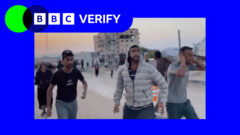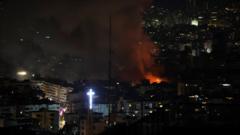This article examines Yasser Abu Shabab’s rise to power in Rafah, southern Gaza, amidst accusations of looting humanitarian aid. It delves into the motivations behind Israeli support for his militia, the Popular Forces, and how this dynamic reflects broader conflicts involving Hamas and local governance.
The Rise of Yasser Abu Shabab: A Key Player in Gaza's Turbulent Landscape

The Rise of Yasser Abu Shabab: A Key Player in Gaza's Turbulent Landscape
An exploration of Yasser Abu Shabab, the controversial leader of a Palestinian militia in Gaza, and the implications of Israeli support for his group.
Yasser Abu Shabab, a Bedouin man in his 30s, has emerged as a significant figure in eastern Rafah, southern Gaza, where his militia is believed to be backed by Israeli officials aiming to counter Hamas. Known as the Popular Forces, Abu Shabab's group, although small in numbers, has drawn attention due to its contentious actions, including accusations of looting aid supplies sent to vulnerable populations suffering from widespread hunger in Gaza.
Israeli Prime Minister Benjamin Netanyahu has defended the collaboration with Abu Shabab’s militia, stating that it serves to activate clans in Gaza that oppose Hamas, a move he argues is beneficial for Israeli security. Analysts interpret this engagement as a reflection of Netanyahu's hesitation regarding who might govern Gaza post-conflict.
Despite denying the receipt of Israeli arms, Abu Shabab’s militia represents a complex facet of the ongoing hostilities in the region. It raises critical questions about the future of governance in Gaza, especially concerning the fragile balance of power between various factions, including Hamas, which views such groups with suspicion and hostility.
As tensions persist and humanitarian needs escalate, the actions and alliances of figures like Yasser Abu Shabab will undoubtedly influence the trajectory of the conflict and the lives of civilians caught in its crossfire. The situation remains fluid, as local and international stakeholders navigate the challenges of providing aid amidst an environment rife with distrust and violence.





















